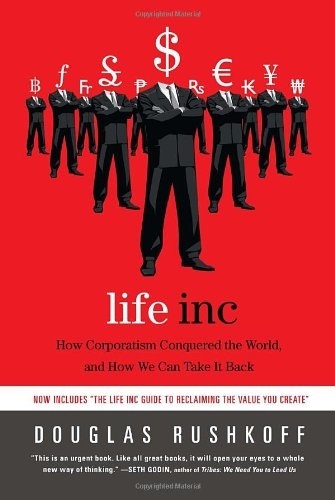










Jonathan Lethem on Life Inc.
Jonathan Lethem is the author of seven novels. A recipient of the MacArthur Fellowship, Lethem has also published his stories and essays in The New Yorker, Harper's, Rolling Stone, Esquire, and the New York Times, among others.
I once sat astonished in the audience at a conference on business law and copyright and watched as Douglas Rushkoff stood on stage and patiently, even gently, explained to a group of record company executives, who'd paid for the privilege of hearing him speak, why it was simply time for them to stop trying to rescue their industry. "You don't make anything of value," I believe he told them, with a tone of humane explanation. Ever since that moment Douglas has been one of my personal heroes, and I've been a most attentive reader of anything he cares to put between covers, knowing that his combination of a cold eye and a warm heart is guaranteed to astonish and embolden my own thinking about what's possible in the world--about what's possible to enact in the space between one human being and another. I don't exaggerate when I say he takes the potentially dry notion of 'public advocacy' and shifts it into the realm of epiphany, and art. That puts him with few living writers--Lewis Hyde, perhaps, and the British psychoanalyst Adam Phillips. Yet Rushkoff is perhaps even braver, or anyway lighter on his feet, working without the protection of any sort of ivory tower. He occupies the ground of our most immediate perplexities, and his reports of what he finds are breaking news.
Life Inc. is Rushkoff's best and most important book. Few texts stand any chance of truly changing your mind, let along saving the world. This is one of them. Rushkoff's the first to put the economic crisis in its greater historical and cultural perspective, and doing so, he reveals the underlying biases and embedded agendas of institutions we take for granted, from banking and central currency to corporations and even the suburbs.
Rushkoff really works the manner of a historical philosopher, but without any off-putting jargon or air of self-reference you'd fear encountering within the discipline--he's writing for his readers. His fundamental gesture here is to reexamine the very meaning and use of the world-concept "corporation." You'll never use it again unthinkingly, nor consent to its automatic use in any conversation that's meant to be halfway serious.
In Life Inc. we're given a concise and acute history of corporatism, from its origins as a way for feudal lords of the Late Middle Ages to maintain their monopolies on power, to its present expression in finance industry bailouts--consistently revealing things we take for granted as inventions with purposes that may not be serving us today. In Rushkoff's persuasive account, our acceptance of corporatism as a given leads us to internalize the values of corporations as our own. We use metrics like the GNP to measure our health as a nation, treat people as competitors or marks to be exploited, and the planet as a resource to be extracted. Each Wal-Mart purchase further bankrupts the local community, alienates us from our neighbor merchants, and makes us less likely to attend the PTA meeting.
Life Inc. is a book to give your uncle the disenchanted union organizer, and your other uncle, the soon-to-be-disenchanted Tea Party activist. Rushkoff goes beyond the left/right dialectic to show how both political parties suffer from a dependence on highly centralized solutions and an unhealthy marriage to corporate interests that know no national allegiances.
I recently wrote about the great John Carpenter movie, They Live, which concerns itself with magic sunglasses that translate the corporate signage all around us back into the raw propaganda it really is at its root: a set of commands to WORK, CONSUME, SLEEP, OBEY. This book is those glasses, a lens for seeing deeper into the world you occupy, the commitments you've chosen, the money in your wallet. Read Life Inc. and you'll want to start organizing a local currency in your neighborhood, I promise you.

